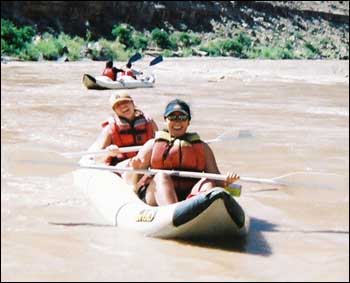Reaching for the stars just got easier for 144 incoming freshmen.
They are enrolled in NAU’s Successful Transition and Academic Readiness summer program, a five-week session of academics, college preparedness programs and fun designed to boost the success rate of incoming first generation, ethnic minority or financially disadvantaged students.
“STAR helped me with the ‘alone factor’ of being away from my family for the first time,” said Paloma Ibanez, a 2004 STAR graduate from Tucson who is now a peer advisor for the group. “Peer advisors give back to the program by helping with anything from academic scheduling to lending a shoulder to lean on.”
The combination of academic assistance with personal guidance contributes to the program’s success, according to Hilda Ladner, director of NAU’s Multicultural Student Center and the STAR program, which began with 75 students in 1988.
|
STAR candidates need to be admitted into NAU for the upcoming fall semester and live on campus during the program, running this year from June 3 through July 3.
Participants receive scholarship funds to pay for the program and earn 6 college credits toward their degree. Their agenda includes learning about campus life and the surrounding area. Students get added assistance from residential and peer advisors, who were once in the program themselves and are trained to support them.
“We select faculty and instructors who want to work with the STAR students and will create an environment where they can succeed,” Ladner said. “We also offer supplemental labs that help students with time management and study skills as well as assistance with difficult material.”
Students attend morning liberal studies requirement courses, and in the afternoon they break into cohorts and meet at one of four NAU colleges that partner with STAR to offer structured programs within different fields of study.
“We keep STAR students very busy,” Ladner said. “Our residential program has something going on almost every day. The students volunteer at events such as helping with the sack races for children at a local Juneteenth celebration, and they will soon visit and learn about Lake Powell.”
Evening programs vary from information sessions about campus organizations to help with financial aid.
Josoanny Audifre, an incoming freshman in the School of Hotel and Restaurant Management said, “The STAR program is making my transition from high school to college easier because in the fall I won’t have to worry about making friends.”
For Ibanez, who is earning her degree in international affairs, the STAR program made all the difference in her adjustment to college life. “It supported me academically and helped me deal with challenging issues such as dorm life,” she said.
For information do to: www.nau.edu/star



